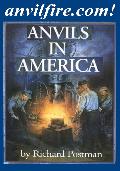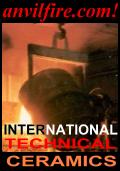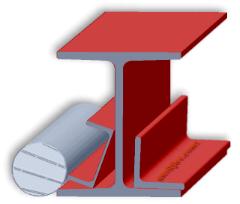|
|
| |
| |
| |
|
| |
|
| |
| |
| |
| |
| |
| |
| |
| |
| |
| |
| |
| |
|




|

Tell them you found it on anvilfire.com!

Blacksmithing and metalworking questions answered.
|

Steel Service Center, bar, plate, alloy
|
|

We get this question fairly often.
For many new to the craft where to get supplies can be a mystery.
The following answer has not changed in decades.
While scrap steel is valuable to the smith eventually new bar stock will be needed for larger projects or for consistency.
You can only go so far relying on scrap unless you have a very good source.
New steel will need to be purchased.
Often your best bet is to ask someone nearby that uses steel where they get theirs.
Your local blacksmithing organization may be very helpful in this regard.
- I. In North America new mild steel and structural steel is purchased primarily from from Steel Service Centers or Wholesale Warehouses.
Look them up in your local phone directory.
- For the individual or cash customer dealing with Steel Service Centers can be difficult but not impossible.
These businesses buy and sell in truck loads preferring to deal with large open accounts.
Cash customers may be required to pay a minimum of $50 or more.
Steel bar comes in 20 foot (6.1 meter) and cold finished steel in 12 foot (3.7 meter) lengths that may need to be cut to be hauled.
So expect to pay a small cutting fee to cut bar in half or thirds.
Cash customers and their small purchases are usually considered a nuisance.
So the trick is NOT be a nuisance any more than possible.
Having to be educated in the basics of the steel business by sales personnel is part of being a nuisance.
Know the difference between hot rolled and cold finish steel (see our FAQ on Steel Product Types).
Also understand that small sizes such as 1/4, 5/16 and 3/8" square may only be available in cold finish bar in 12 foot lengths.
From 1/2" up the available size increment is 1/8". Over 1-1/2" the generally available increments are 1/4".
Hot roll bar which is most often A36 structural steel is less expensive than cold finished.
For decorative ironwork the less expensive steel is used when available but size is often more important than the cost difference.
Repeatedly asking for quotes and not making a purchase is being a nuisance.
Complaining about cutting fees is a nuisance. Calling about orders late Friday can be a nuisance.
Asking how much a bar of steel weighs is a nuisance (every reference, or catalog has bar weights, look them up).
While this is a "cash" sale these businesses generally do not do business in cash.
They would probably prefer a bank cheque.
Ask about the prefered form of payment.
So, ask for a quote, be willing to buy enough to make the minimum and expect to wait for the cutting after you pay.
Act professionally and even though it is a small sale they will appreciate your business.
Developing a good business relationship with your suppliers is important.
- II. The local construction supply, wholesale hardware or Ferreteria in some places may handle steel bar for resale.
- Most will have re-bar or concrete reinforcing steel.
This is not particularly good material to use but may be what is available.
Rebar is often used for decorative work but only when it is the only thing available OR for specific artistic reasons.
Note that wholesale hardware stores are not the same as the common retail type.
Wholesale hardware stores supply small retail stores and carry industrial supplies.
These places are a bit easier to do business with but their prices may be a little higher and some may have minimums.
- III. Machine shops, welding shops, fabricators and other blacksmiths MAY sell you steel.
- Note however that these places generally are NOT in the business of reselling steel except as a finished product.
They buy steel as raw material and probably do not have a system in place to resell it.
Since they pay the same price at the nearest service center as you would, PLUS delivery costs, or their trucking costs, the price to you should be about double the warehouse price.
When doing business with the fabricators and blacksmiths remember that you may be considered a competitor.
One man hobby shops with low overhead and little need for profit often get jobs by underbidding commercial shops and are thus a thorn in the side of the commercial shops.
Alternately, the hand forging blacksmith may be no competition and occassionally my be helpful making custom components for the fabricator.
Deal with them with all the above in mind.
- IV. Retail hardware stores, farm suppliers or neighborhood Ferreteria.
- Many small neighborhood stores and larger "big box" stores may carry a small selection of steel bar in 3 foot or meter lengths.
Most of this stock is thinly zinc plated (galvanized) to prevent it from rusting while on the shelf.
The zinc fumes can be hazardous when burned off and the oxides will prevent forge welding.
While this material is handy for cold working it should be avoided for hot work.
Note that it MAY be possible to have these folks order steel without the galvanizing.
Special orders may have to be prepaid and minimums will probably apply. Ask questions.
- V. On-Line Stores - Catalog Houses
-
Business such as McMaster Carr, on-line metals stores and various decorative iron suppliers such as the Wagner Group sell many types of steel and are easy to do business with via credit card.
Most on-line services carry mostly alloy and specialty steels as well as non-ferrous metals.
However some carry specialty shapes such as half rounds (for farriers), pre-trwisted bar and small mild steel bar for blacksmiths.
See more under "Alloy, Tool Steels and Blade Steels", and "Specialty Shops" below.
Due to cutting and shipping costs material from most on-line services is not suitable for large decorative jobs.
- VI. Scrap Yards or Junk Yards
- It used to be that you could walk into any scrap yard and be welcome to scrounge around in their yard.
Today, due to legal problems or insurance regulations most yards are closed to the would-be small buyer.
It also used to be that these folks were happy to sell you 10 or 20 pounds of steel at ten times what they paid for it.
Today they may only be equipped to weigh truck loads. They will be glad to buy scrap from you but not to sell it back.
Those yards that still do business with the public can be wonderful resources.
However, they ARE in the scrap business and when prices are right everything goes.
SO, one time they may have bar and plate, and the next time nothing but old rusted pipe and cast iron radiators.
A FEW of these places are in both the scrap AND steel warehouse business.
However, their supply is usually second hand and there are no guarantees what the alloy or chemistry of any material they have on hand.
These yards often sell steel inventory that has rusted and much of what they store is in open sheds.
They may have odd lengths of structural steel beam and angle.
Quantities of any given size or shape may be limited as they ARE in the second hand steel business.
Junk Yard Steel rules apply.
These are often your best source for plate and heavy chunks of steel.
They will have some sort of cutting services. Materials may all be flame cut or occasionally rough sheared.
Losses due to the rough cutting methods may have to be considered.
Prices will be NEARLY the same as the steel service center but they may sell in cut lengths where you would otherwise need to purchase full 20 foot pieces.
Explore these resources. You may be disappointed, or not.
Recognize the dynamics of these businesses and that you may not be able to rely on them.
It often pays to be an opportunistic buyer.
- Alloy, Tool Steels and Blade Steels
- Generally the places mentioned above do not carry specialty steels. If they do, it is usually an accident.
Stainless is usually handled by specialists who may also carry non-ferrous materials (aluminium and copper alloys).
Large wholesale hardware stores and the machine shop MAY carry tool steel such as O1 and W2 in drill rod and flat bar.
If you do not have a local supplier then on-line resources are your best bet for these materials.
Our On-line Metals store and McMaster-Carr are very good sources.
While their prices may be a tad high on common mild steel they may also sell it to you in lengths as short as a foot and be easy to deal with.
There are also specialty on-line shops for bladesmiths' materials.
- Wrought Iron, Pure Iron. Double Ought Steel
-
Wrought Iron (pure iron with laminar slag inclusions) was THE ductile product used by smiths in Europe and the Americas until the 1960's when the last supplies dried up.
It is no longer manufactured anywhere in the world except by some experimental archeo-metallurgists.
In England the "Real Wrought Iron Company" reprocesses scrap wrought into new bar. Scrap is welded and rolled into bar and plate.
This is generally the same as new wrought iron but because it is reprocessing the supply is limited.
This material is difficult to obtain in the United States.
Occasionally wrought iron can be found as scrap.
Entire iron bridges were made of wrought and it was a favorite for wrought fencing and wagon wheel rims.
You find it where you find it. Some folks are finders and can find such rare materials almost anywhere.
Wrought resold as scrap often brings more than $1/pound and more if in useable bar form.
Pure Iron is made by steel mills as the precursor to making alloy and high carbon steels.
It can be ordered rolled to form in 20 ton lots.
A European company specializes in producing "Pure Iron" for resale to smiths and it can be purchased in France, England and the US (occasionally).
Pure Iron is not the same as wrought iron. It is not truly pure elemental iron as it contains a small amount of silicon and carbon.
It does NOT have the laminar structure and self fluxing nature of wrought iron.
Pure Iron is expensive and the sizes and shapes are limited.
In the U.S. a fellow had pure iron produced by a mill and rolled into 1/4" plate which was then sheared into bar of various widths.
Due to the purity being less than .00% he called it "Double Ought Iron". The problem with this product was the available sizes.
Folks doing high dollar architectural work need their material in everything from rectangles and rounds several inches across down to the smallest commercial bar.
The advantages of Pure Iron and wrought is the high ductility and corrosion resistance.
Pure iron and high quality wrought is sought after for plate work or repousse'.
Otherwise it is very expensive material with little advantage.
Note that these low carbon materials are much weaker than mild steel.
Gates and such made of it will sag much easier than those made of mild steel.
These products are only available from specialty suppliers such as architectural metals and blacksmiths suppliers.
- Specialty Shops
- Last, but not least, there are blacksmiths and fabrication suppliers that sell special shapes (such as half rounds), textured and embossed bar.
While they generally do not carry a full line of structural steel or plain bar stock they may carry some and be easy to deal with.
Since these places are few expect to pay shipping probably by UPS and overlength fees.
- Cutting and Hauling
- Most of us cannot handle 20 foot lengths of steel so cutting and cutting fees are the norm.
Most warehouses are setup for cutting to haul but may not be particularly accurate.
Never expect to get two exact half lengths from warehouse cutting unless you are buying specific cut lengths and accuracy to some tolerance is understood. Otherwise expect +/- 6" (15cm).
Service Centers and Warehouses often do production cutting and are often very competitive doing so.
Their accuracy is much better and usually acceptable in this case.
Always consider this if you need hundreds or thousands of cut lengths.
When you do not know what lengths you need I have found it convenient to have 20 foot sections cut into 12 feet and 8 feet.
This assures that you have some longer than, or that can be cut exactly to 10 feet OR 10 feet plus end forging such as right angle attachment points.
The rest will probably be cut into short pieces for scrolls and such.
Within a certain range many places will deliver for free OR for a small fee.
Remember that they will be driving a large flat bed commercial truck that may be prohibited from traveling into residential neighborhoods OR may have trouble navigating small rural roads.
You may find it helpful to have another smith or nearby shop that does a high volume and gets free or low cost shipping to order your steel for your.
Few trucks are long enough for even 12 foot lengths of steel.
Pickups need stock racks to let the steel extend over the roof or careful flagging if the stock extends out of the bed.
I have found it almost as convenient to haul bar on the luggage rack of a station wagon or mini-van.
These vehicles are usually over 12 feet in length so the bar does not extend beyond the bumpers.
Be sure to carefully tie down the load. Packing tape or duct tape can be used to tightly bundle small bar.
Be sure to tape over ends lest bars in the center of a bundle slip out.
Loads slipping forward due to unexpected hard braking is usually the worst case to consider. Acceleration is second.
Written August 2009, Updated September 2009.
|
|
|




While scrap steel is valuable to the smith eventually new bar stock will be needed for larger projects or for consistency. You can only go so far relying on scrap unless you have a very good source. New steel will need to be purchased.
Often your best bet is to ask someone nearby that uses steel where they get theirs. Your local blacksmithing organization may be very helpful in this regard.
Having to be educated in the basics of the steel business by sales personnel is part of being a nuisance. Know the difference between hot rolled and cold finish steel (see our FAQ on Steel Product Types). Also understand that small sizes such as 1/4, 5/16 and 3/8" square may only be available in cold finish bar in 12 foot lengths. From 1/2" up the available size increment is 1/8". Over 1-1/2" the generally available increments are 1/4". Hot roll bar which is most often A36 structural steel is less expensive than cold finished. For decorative ironwork the less expensive steel is used when available but size is often more important than the cost difference.
Repeatedly asking for quotes and not making a purchase is being a nuisance. Complaining about cutting fees is a nuisance. Calling about orders late Friday can be a nuisance. Asking how much a bar of steel weighs is a nuisance (every reference, or catalog has bar weights, look them up). While this is a "cash" sale these businesses generally do not do business in cash. They would probably prefer a bank cheque. Ask about the prefered form of payment.
So, ask for a quote, be willing to buy enough to make the minimum and expect to wait for the cutting after you pay. Act professionally and even though it is a small sale they will appreciate your business. Developing a good business relationship with your suppliers is important.
These places are a bit easier to do business with but their prices may be a little higher and some may have minimums.
When doing business with the fabricators and blacksmiths remember that you may be considered a competitor. One man hobby shops with low overhead and little need for profit often get jobs by underbidding commercial shops and are thus a thorn in the side of the commercial shops. Alternately, the hand forging blacksmith may be no competition and occassionally my be helpful making custom components for the fabricator. Deal with them with all the above in mind.
Due to cutting and shipping costs material from most on-line services is not suitable for large decorative jobs.
Those yards that still do business with the public can be wonderful resources. However, they ARE in the scrap business and when prices are right everything goes. SO, one time they may have bar and plate, and the next time nothing but old rusted pipe and cast iron radiators.
A FEW of these places are in both the scrap AND steel warehouse business. However, their supply is usually second hand and there are no guarantees what the alloy or chemistry of any material they have on hand. These yards often sell steel inventory that has rusted and much of what they store is in open sheds. They may have odd lengths of structural steel beam and angle. Quantities of any given size or shape may be limited as they ARE in the second hand steel business. Junk Yard Steel rules apply.
These are often your best source for plate and heavy chunks of steel. They will have some sort of cutting services. Materials may all be flame cut or occasionally rough sheared. Losses due to the rough cutting methods may have to be considered. Prices will be NEARLY the same as the steel service center but they may sell in cut lengths where you would otherwise need to purchase full 20 foot pieces.
Explore these resources. You may be disappointed, or not. Recognize the dynamics of these businesses and that you may not be able to rely on them. It often pays to be an opportunistic buyer.
Occasionally wrought iron can be found as scrap. Entire iron bridges were made of wrought and it was a favorite for wrought fencing and wagon wheel rims. You find it where you find it. Some folks are finders and can find such rare materials almost anywhere. Wrought resold as scrap often brings more than $1/pound and more if in useable bar form.
Pure Iron is made by steel mills as the precursor to making alloy and high carbon steels. It can be ordered rolled to form in 20 ton lots. A European company specializes in producing "Pure Iron" for resale to smiths and it can be purchased in France, England and the US (occasionally). Pure Iron is not the same as wrought iron. It is not truly pure elemental iron as it contains a small amount of silicon and carbon. It does NOT have the laminar structure and self fluxing nature of wrought iron. Pure Iron is expensive and the sizes and shapes are limited.
In the U.S. a fellow had pure iron produced by a mill and rolled into 1/4" plate which was then sheared into bar of various widths. Due to the purity being less than .00% he called it "Double Ought Iron". The problem with this product was the available sizes. Folks doing high dollar architectural work need their material in everything from rectangles and rounds several inches across down to the smallest commercial bar.
The advantages of Pure Iron and wrought is the high ductility and corrosion resistance. Pure iron and high quality wrought is sought after for plate work or repousse'. Otherwise it is very expensive material with little advantage. Note that these low carbon materials are much weaker than mild steel. Gates and such made of it will sag much easier than those made of mild steel. These products are only available from specialty suppliers such as architectural metals and blacksmiths suppliers.
When you do not know what lengths you need I have found it convenient to have 20 foot sections cut into 12 feet and 8 feet. This assures that you have some longer than, or that can be cut exactly to 10 feet OR 10 feet plus end forging such as right angle attachment points. The rest will probably be cut into short pieces for scrolls and such.
Within a certain range many places will deliver for free OR for a small fee. Remember that they will be driving a large flat bed commercial truck that may be prohibited from traveling into residential neighborhoods OR may have trouble navigating small rural roads. You may find it helpful to have another smith or nearby shop that does a high volume and gets free or low cost shipping to order your steel for your.
Few trucks are long enough for even 12 foot lengths of steel. Pickups need stock racks to let the steel extend over the roof or careful flagging if the stock extends out of the bed. I have found it almost as convenient to haul bar on the luggage rack of a station wagon or mini-van. These vehicles are usually over 12 feet in length so the bar does not extend beyond the bumpers. Be sure to carefully tie down the load. Packing tape or duct tape can be used to tightly bundle small bar. Be sure to tape over ends lest bars in the center of a bundle slip out. Loads slipping forward due to unexpected hard braking is usually the worst case to consider. Acceleration is second.
References and Links
- ABANA-Chapter.com Find your local blacksmithing organization.
- Steel Product Types Industry terminology and product definitions.
- Junkyard Steel Using recycled steel or steels of unknown pedigree.
- Wrought Iron The material, identification and images.
- MACHINERY'S HANDBOOK, Industrial Press, Steel shapes, alloy specs, heat treating. . .
Written August 2009, Updated September 2009.